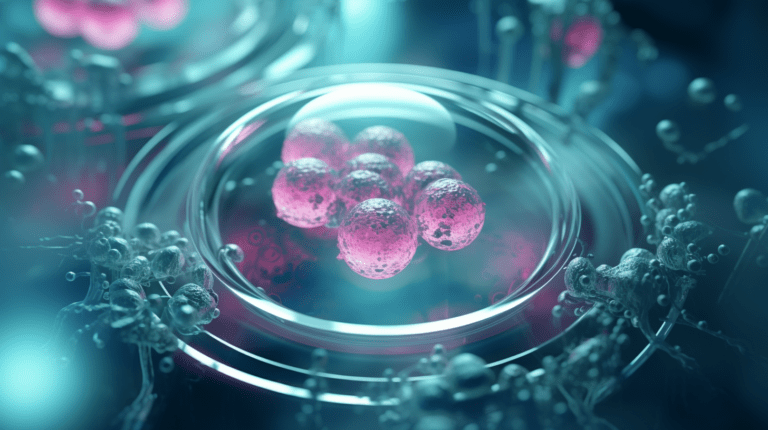Exploring the intersection of iPSC technology, regenerative medicine, and quality control methods in a rapidly evolving biotech space
Key Takeaways:
- Induced pluripotent stem cells (iPSCs) are the future of regenerative medicine, but quality and consistency are paramount
- mRNA-based reprogramming offers higher efficiency and safety for iPSC generation than DNA-based reprogramming
- Ensuring consistent quality in iPSC-derived cell therapy requires a comprehensive approach that includes core technology, GMP compliance, good cell banking practices, and risk management
In the rapidly advancing world of biotechnology, a game-changing innovation has emerged: induced pluripotent stem cells (iPSCs). Dr. Jiwu Wang, the President and CEO of Allele Biotechnology Pharmaceuticals Inc., recently hosted an enlightening webinar exploring the profound impact of environmental cues on stem cell phenotypes. Join us as we delve into the fascinating realm of iPSCs, their pivotal role in regenerative medicine, and the critical importance of quality control in this revolutionary field.
What are iPSCs, and why do they matter?
iPSCs are reprogrammed cells, often derived from adult tissues like skin or blood, that possess a remarkable ability: they can transform into various cell types, just like embryonic stem cells. This remarkable feat is achieved through a process of genetic reprogramming, which essentially winds back the clock on a cell’s development, restoring it to a pluripotent state.
The importance of iPSCs in regenerative medicine cannot be overstated. They hold the potential to revolutionize how we treat diseases and repair damaged tissues. Unlike embryonic stem cells, iPSCs sidestep ethical concerns as they are derived from a patient’s own tissues, reducing the risk of immune rejection. This means the iPSCs-based therapies can be personalized, offering hope for conditions ranging from heart disease to neurodegenerative disorders.
Culturing iPSCs for Long-Term Success
Stem cells, particularly iPSCs, are not just a niche in biosciences, they form the vanguard in the rapidly growing field of cell therapy. With over 2,000 clinical trials globally as of 2021, iPSCs have proven their worth in regenerative medicine. However, their utility is closely linked to the quality of the end product, which depends largely on the cell culture environment and adherence to good manufacturing practices (GMPs). Dr. Wang shed light on these best practices:
- Core Technology: The journey begins with obtaining high-quality iPSC lines. A strong foundation is crucial for long-term success
- cGMP Compliance: Ensuring good quality and consistency in iPSC production requires compliance with current GMPs
- Good Cell Banking Practice: Maintaining cells and regularly checking their quality is essential
- Risk Management: Identifying and mitigating risks in the iPSC production process is key
mRNA vs. DNA-Based Cell Reprogramming
In generating iPSC lines, Dr. Wang compared traditional DNA-based methods that use episomal plasmids or the Sendai virus with newer techniques that rely on mRNA transfection. mRNA-based reprogramming utilizes IVT-synthesized mRNA with coding regions of reprogramming factors that result in high efficiency and safety, thanks to its lack of nuclear events. In contrast, DNA-based reprogramming lags with lower efficiency and safety concerns related to genome integration. The takeaway? mRNA reprogramming is more effective and safer for iPSC generation.
Quality Control: The Cornerstone of iPSC Success
A critical consideration of iPSC-based therapy is the quality of the iPSCs, which depends on key factors including:
- Genome Integrity: iPSCs are designed to be footprint-free, ensuring better genome integrity between parental cells and derived iPSCs than other methods. Genetic background screening and genome stability studies are an essential part of this process
- Expansion Potential: Self-renewal capabilities, consistent post-thaw viability, and cell morphology with high nucleus-to-cytoplasm ratios are key quality indicators in iPSCs
- Differentiation Potential: To be broadly applicable, iPSCs should have the potential to differentiate into many cell types, including ectoderm, mesoderm, and definitive endoderm
- Gene Editing: For specific applications, genome editing is necessary. The Mad7 CRISPR platform enables genomic editing, gene knockouts, and transgene engineering
- cGMP Compliance: Ensuring quality in iPSCs involves multiple steps, from donor education and IRB-approved informed consent to stability studies and tissue shipping validation
The Road Ahead: iPSCs in Regenerative Medicine
The world of iPSCs is poised for a breakthrough in regenerative medicine. These reprogrammed cells hold the promise of personalized treatments and unprecedented disease management. Dr. Wang’s webinar insights were not only informative but also inspiring, especially for recent biosciences graduates seeking biotech jobs and career advice. In understanding the potential of stem cells in the biotech industry, anyone can find their place in this groundbreaking field.
For those of you intrigued by this topic, we invite you to explore job opportunities at Greatness.bio and become a part of this ever-evolving field.
The link to the full webinar can be found here.
Speaker: Jiwu Wang, Ph.D.
President and CEO Allele Biotechnology Pharmaceuticals Inc.
An expert in the realm of pre-mRNA splicing regulation and protein-RNA interactions, Dr. Wang embarked on his academic journey with graduate and postdoctoral studies, culminating at UCSD. Leveraging this expertise, along with the assistance of a passionate team and the support of numerous NIH grants, he founded Allele Biotech. The company stands at the forefront of biomedical research, pioneering in areas like RNAi, FP, and iPS, always with the goal of deciphering the intricate mechanisms of biological processes to produce groundbreaking technologies.

